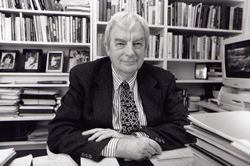Thomas Sobol, Shirley Ann Jackson and Lee Shulman are Convocation Speakers
The convocation for the Teachers College doctoral degree graduates will be Wednesday, May 16, at
Teachers College Medal Recipients
Dr. Thomas Sobol, Professor Emeritus and
Sobol recently retired as TC's first Christian A. Johnson Professor of Outstanding Educational Practice, in which role he supervised the Inquiry Program, the College's largest doctoral program for public-school leaders, and oversaw the Superintendents Work Conference. In the 1990s, as New York State's Commissioner of Education, he led authorship of A New Compact for Learning: Improving Public Elementary, Middle, and Secondary Education Results, which was among the first documents to codify a state's achievement standards, including key concepts and competencies the students were required to know at different grade levels. He consciously shaped that document to offer a rationale for a legal argument that children should be given the necessary resources to succeed in school, and subsequently played a leading role in advancing just such a legal argument. Named, by virtue of his position, as a defendant in the landmark Campaign for Fiscal Equity educational adequacy suit against
Sobol recently was honored at the American Association of School Administrators with a lifetime achievement award. Though retired, he is now leading a coalition of retired and current superintendents who are trying to focus attention on key issues.
The Honorable Shirley Ann Jackson, Ph.D., President, Rensselaer Polytechnic Institute
Dr. Shirley Ann Jackson is the 18th President of Rensselaer Polytechnic Institute,
Described by Time Magazine (2005) as "perhaps the ultimate role model for women in science," she has held senior leadership positions in government, industry, research, and academe. President Jackson is among the leading voices nationally working to address what she has described as the "quiet crisis" in the
Since her arrival in 1999, Dr. Jackson has fostered an extraordinary renaissance at
Dr. Jackson, a theoretical physicist, was chairman of the U.S. Nuclear Regulatory Commission (1995-1999), a research scientist at the former AT&T Bell Laboratories, and a professor of theoretical physics at
Dr. Jackson holds an S.B. in physics and a Ph.D. in theoretical elementary particle physics from M.I.T.
Dr. Lee Shulman, President of the Carnegie Foundation for the Advancement of Teaching
He established a national reputation through his groundbreaking studies of medical reasoning and the cognitive processes involved in medical problem solving -- then followed these by conducting technical studies in the field tests that led to the creation of the National Board for Professional Teaching Standards. As eighth President of the Carnegie Foundation for the Advancement of Teaching, he has brought to bear an expertise across varied areas and disciplines. This has enabled him to compare educational interventions to medical treatments, and to explore the rich notion that they simultaneously heal and introduce new variables into the system that trigger "cascades" of unforeseen consequences. That idea, in turn, has laid the ground for Carnegie's view that "one must always look -'upstream' to understand the current nature of problems" and that "nearly every sector of the educational system can be simultaneously viewed as both upstream and downstream."
Shulman is past president of the American Educational Research Association (AERA) and received its career award for Distinguished Contributions to Educational Research. He is a member of the National Academy of Education, having acted as both vice president and president. He is the recipient of the American Psychological Association's 1995 E.L. Thorndike Award for Distinguished Psychological Contributions to Education, a fellow of both the American Academy of Arts & Sciences and the American Association for the Advancement of Science, a Guggenheim Fellow, a Fellow of the Center for Advanced Study in the Behavioral Sciences and has been awarded the 2006 Grawemeyer Prize in Education.
In 2004, Shulman's collected writings on teacher education and higher education were published by Jossey-Bass Inc., in two volumes, The Wisdom of Practice and Teaching as Community Property. He is one of the authors of Educating Lawyers: Preparation for the Profession of Law (Carnegie/Jossey Bass, 2007). His research has dealt with the quality of teaching and teacher education; knowledge growth among those learning to teach; the assessment of teaching; medical education; the psychology of instruction in science, mathematics and medicine; the logic of educational research; and the quality of teaching in higher education. His most recent studies emphasize the central role of a "scholarship of teaching" in supporting needed changes in the cultures of higher education, and the function and features of signature pedagogies in professional education.
Published Wednesday, Apr. 25, 2007
